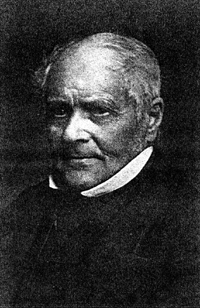
MFH Home
Family Trees
Records
Wills
MIs
Studies
Memories
People
Places
Related Families
Odds & Ends
Mail David
 Dr.
George May
Dr.
George Mayfrom the Berkshire Bell and Counties Review,
July 1884
Born:
2nd January 1799 & Died: 8th May 1884
Few
names are better known in Reading than that of the late Dr. May, as he was
popularly styled; and few individuals are more entitled to a place in this
series. The relief of suffering humanity is of itself an ennobling
pursuit; but when this is supplemented by other qualities, inherent in the
subject, the whole tends to assist the development of a worthy existence.
Such, practically, is the life-record of Mr. George May, whose death
created such a profound sensation, and called forth an unwonted expression
of public sympathy. Mr. May was not a native of Reading, but he took up
his residence in the town in 1822 - being then in his twenty-third year -
and has since continued to be one of its most interested burgesses.
Shortly after his arrival, he was appointed surgeon to the Reading
Dispensary, and was elected a member of the first reformed Corporation of
the Borough in 1835. In 1839, on the establishment of the Royal Berks
Hospital, Mr. May was appointed to a post on its first medical staff, with
which, be it noted, he was associated till the day of his death. In 1845,
he actively supported a scheme for the more effective drainage of the town
and though the proposal met with much opposition at that time, its most
salient points were ultimately adopted. Indeed, Mr. May was always
interested in sanitary questions being rightly of opinion that defective
sanitation was the source from which spring many more or less minor ills;
and it is said he viewed with pleasurable feelings the inception of the
new drainage system, which has done so much to improve sanitary condition
of the town.
His
name has become associated with several local institutions - notably, the
Reading Volunteer Corps, to which he acted as medical officer from the
time' of its enrolment; and St. Giles' Church of which he was a warden for
many years, being also one of the earliest members of the church board
founded by Mr. Fosbery for the purpose of efficiently dealing with
questions affecting the financial and general welfare of the parish. He
was a liberal supporter of the church and school funds; but had a healthy
objection to contributing towards the “clearing off of old scores,”
believing as he did that churches should set an example in all their
business affairs. Shrewd and thrifty, his advice proved acceptable on many
occasions, and though he was by no means of an arrogant disposition, his
views were generally conceded to be sound and practical. He came to
Reading with little beyond his good name - the late Mr. Weedon and he
being the joint possessors of less than half-a-crown! - and attained his
subsequent high position solely by reason of his skill and integrity.